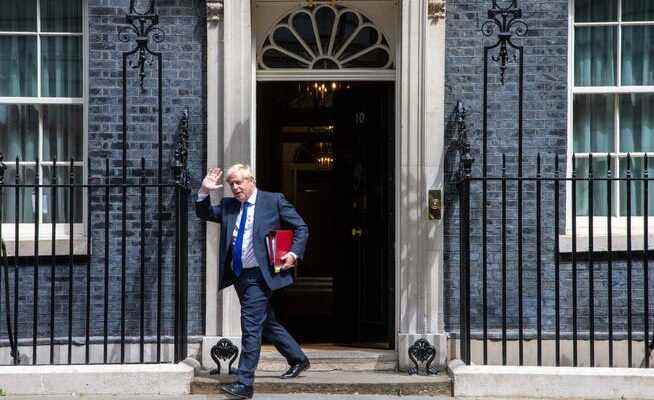The past few days have completely shattered the trust between Boris Johnson and his party. Now the prime minister sees no way out and wants to announce his resignation on Thursday. It is unclear whether he can remain in office until autumn.
Prime Minister Boris Johnson leaves 10 Downing Street on Wednesday. At that point, several ministers had already resigned.
Boris Johnson was still combative on Wednesday evening. His entourage said in the Sun that the rebels would have to bloody their hands to get him out of his Downing Street office. On Thursday morning, however, Johnson also had to acknowledge that his time had irrevocably expired. News leaked through British media that Johnson intended to comment on the same day and announce his resignation.
“Go now!”
In the hours before, the government crisis had again escalated dramatically. After a wave of around fifty resignations from the enlarged government, it became impossible for Johnson to fill the vacant ministerial and adviser posts. The coup de grace was delivered to Prime Minister Nadhim Zahawi, whom Johnson promoted to Finance Minister just two days ago. In a remarkable letter to Johnson, he said things were getting worse for him, for the Tory party and for the country. “Prime Minister, you know in your heart what the right decision is, go now!”
Prime Minister: This is not sustainable and it will only get worse: for you, for the Conservative Party and most importantly of all the country. You must do the right thing and go now. pic.twitter.com/F2iKT1PhvC
— Nadhim Zahawi (@nadhimzahawi) July 7, 2022
When exactly Johnson will go public was initially unclear. Downing Street said Johnson wanted to step down as party leader but remain in office as acting prime minister until the party elected a successor in the autumn. But there were increasing voices from MPs demanding that Johnson move out of Downing Street immediately and leave business to his deputy Dominic Raab.
With his refusal for days to recognize the signs of the times and to resign voluntarily in the spirit of British tradition, Johnson destroyed a lot of trust and caused damage to the ground. The backbenchers had had to threaten to change the internal party rules and chase him out of office with a second internal party vote of no confidence at the beginning of the week. Several cabinet members suggested that he resign – including his long-time colleague Michael Gove, whom Johnson fired in an angry act of revenge on Wednesday evening.
scandals and affairs
Johnson has been in office for 2 years and 348 days – exactly the same length as Nevin Chamberlain, who resigned in 1940. Johnson’s predecessor Theresa May, whose dismantling Johnson was instrumental in, came to 3 years and 11 days. Just a few weeks ago, Johnson, in total misjudgment of reality, declared that he would remain in office for the next decade.
Johnson’s resignation marks the dramatic end of months of affairs and scandals that centered on illegal Downing Street lockdown parties. Most recently, a sexual harassment affair was sparked by a Tory MP whom Johnson had promoted to the position of deputy leader. After days of evasions, the Prime Minister had to admit that, contrary to earlier statements, he was aware of similar allegations.
From the point of view of a number of Tories, the affair seemed to be the last straw. As a result, two political heavyweights, Finance Minister Rishi Sunak and Health Minister Sajid Javid, resigned from the cabinet, decisively undermining Johnson’s authority.
